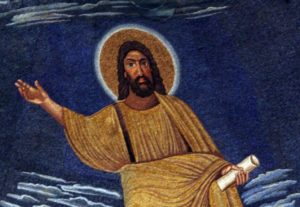
Recently a friend of mine asked if I thought we were nearing the end of the world. (“We are nearer than previously, I suppose,” I answered sagely.) My friend had been reading his newspaper, I think, and might have felt alarmed by the morning’s blaring headlines. He was reading his Bible, too — and settling lately in apocalyptic passages in Daniel, and Ezekiel, and the Revelation to St. John.
“Apocalypse” is a Greek word meaning, simply, revelation; the Bible’s “apocalyptic” literature reveals God’s heart and will for his people. It gives particular attention to the “last times” and the conclusion of human history. When the headlines are alarming, apocalyptic passages remind us of the inexorable purposes of God working out his design for the ages. When banks collapse, or nations teeter, or brothers and sisters are persecuted, or calamity impinges, apocalyptic passages reveal God’s dependable sovereignty. The Bible’s apocalyptic literature was written for uncertain times like these. So it is not surprising that the morning’s headlines led my friend to read Ezekiel and wonder about the end of the world.
One of my favorite passages in this entire corpus — and one of the most poignant in all of Scripture, I think — comes in the Book of Revelation, chapter five.
You will, perhaps, remember the setting. The Apostle John has been exiled on the Island of Patmos, a victim of first-century persecution (1:9). There he meets an angel (1:1,2) who will accompany the Apostle on a wonder-filled journey into the heart of heaven. The book of Revelation recounts the events that follow (1:19).
By the time we get to chapter five, John is standing before the throne of the Almighty himself. In God’s right hand, John sees a scroll — an extraordinary thing, we are told, written inside and out — packed full of heaven’s secrets, no doubt (5:1; cf. Ezekiel 2:9-10). Some commentators think of it as heaven’s “book of destiny.” Some believe it may be the Lamb’s “book of life” (cf.13:8). The scroll seems to represent God’s own plan for the world and its peoples — the meaning and conclusion of everything. It is the heart of John’s revelation, found at the heart of heaven itself.
And it is sealed tight. No one — no one! — is able to open the scroll or reveal its heavenly secrets (5:3).
The disappointment in this passage is extreme: John “weeps bitterly” (5:4). Why do the good seem to suffer — and sometimes die too soon? In the scroll you might have found an answer. Why do the evil seem so often to prosper? You might have found an answer in the scroll. Why do stock markets fall and nations teeter? Why are apostles imprisoned? And the world remains home to more than two billion who have yet to hear the Good News! Why? Will there be no answer? Will no one open the scroll? You might have wept, too.
While John weeps, however, the Lamb of God appears on the scene. There is one who is able to open the scroll — one who stands at the center and conclusion of history, however chaotic it appears in the morning’s headlines. He is himself history’s conclusion. It is the Lamb! And his name is Jesus.
In these few verses, we find a useful summary of Biblical apocalyptic teaching: (1) We cannot “unlock the scroll” on our own, no matter how hard we try; and, (2) Jesus can. We cannot discern the meaning of time and history; Jesus comprehends it entirely. Why, we cannot even unravel the purpose of this morning’s newspaper; but Jesus does. Jesus will.
We find mission in this passage, too — right at the heart of heaven. Biblical apocalyptic teaching always leads to mission, and love, and service. If an apocalyptic teaching does not lead to mission, in fact, it has lost its Biblical mooring.
You see, John expects to find a Lion breaking open the scroll with a mighty roar (5:5). But when he looks, there is only the Lamb, “standing as if it had been slaughtered” (5:6). He sees the Crucified One. It is the cross, the mission of Jesus, the spilled blood of his sacrifice and his irrepressible love that stand at the heart of this vision. It is his mission to “every tribe and language and people and nation” (5:9). It is “a kingdom and priests serving our God” — with Jesus at the center (5:10).
So when you are alarmed at the morning’s headlines, like my friend, here is my apocalyptic counsel: turn simply and swiftly to Jesus. And then: turn again to love and serve your neighbor. The end of the world, I suppose, is rather nearer today than previously. Praise God! — we have this day to live for him.